Читать книгу Horse Genetics - Ernest Bailey - Страница 49
На сайте Литреса книга снята с продажи.
Mutations and variants affecting proteins
ОглавлениеWhere does genetic variation come from? Sometimes DNA is altered. We know that some chemicals, UV light, and radiation can alter DNA. In addition, random errors may occur when DNA strands are being copied. When this happens, the change is called a mutation. Most mutations do not cause problems. Most DNA does not code for genes, so most changes are of little consequence (Chapter 6). Furthermore, the redundancy of the genetic code also prevents many mutations from having an effect on the protein. A mutation in the codon GAA changing it to GAG would still code for the amino acid, glutamic acid (see Table 4.1). These kinds of mutations are called silent mutations or neutral mutations or, more commonly synonymous mutations since they do not change the amino acid. When the DNA sequence change does substitute a different amino acid, this may or may not have an impact on the protein. These types of mutations are called non-synonymous mutations.
Another type of mutation is called a frameshift mutation, caused by an insertion or deletion of a base coding for an amino acid. As noted above, the genetic code specifies amino acids based on reading the DNA in frames of three bases. If a base is added or deleted, this causes a shift in the reading frame of the codon. As a result, the amino acids in the protein following the frameshift mutation are very likely to be changed and may include a stop codon, halting the translation process entirely. An example of a deletion causing a frameshift mutation is the variant responsible for severe combined immunodeficiency (SCID) in Arabian horses (see Chapter 16).
